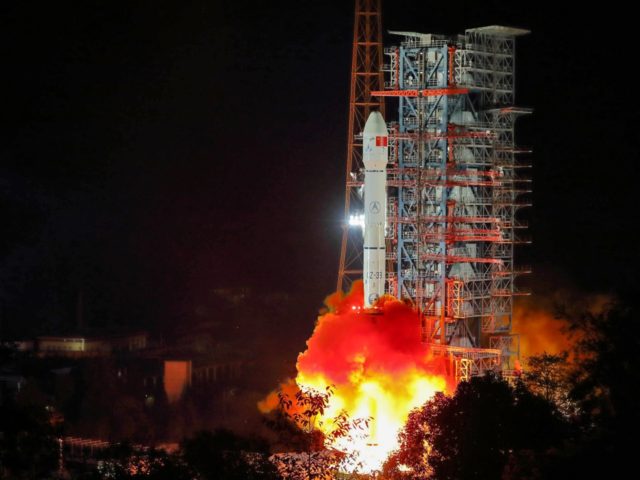China’s state-run Global Times on Tuesday quoted speculation by a Chinese aerospace expert that Beijing could put a man on the moon by 2035.
Although the article was written as a quick reaction to an American official claiming the U.S. remains far ahead in the space race, other observers believe the Chinese could be building up to a manned lunar landing.
The Global Times article is highly speculative. Although the title cites “observers” who say “China is expected to send a man to the moon by 2035,” the article is based entirely on the opinion of one man, Wang Ya’nan, identified as the editor of a magazine called Aerospace Knowledge.
The Global Times claimed an unspecified number of unnamed social media users agreed vaguely that a moon landing will soon become feasible: “Encouraged by China’s space achievements, many posted online that lunar exploration was viable in the foreseeable future.”
Wang is the only source cited by name and quoted directly in the article, and even he was very tentative in projecting the date when China might attempt a moon shot:
The space expert told the Global Times Tuesday that unlike the Apollo projects with their Cold War competition between the US and the Soviet Union, China’s manned lunar landing, hopefully in the “decade between 2030 to 2040,” would be conducted with clear and specific scientific research goals.
Such goals include exploring the possibility of establishing a permanent moon village or base for researchers to conduct long-term scientific projects and using the natural satellite of the Earth as an energy supply hub for deeper space exploration, Wang said.
The Global Times piece was prompted largely by U.S. Vice President Mike Pence commemorating the 50th anniversary of the first lunar landing by calling for the United States to return to the moon within five years, and NASA Administrator Jim Bridenstine piquing Beijing’s ire on Sunday by boasting the U.S. is “so far ahead of China right now, it’s not even a comparison.”
The Global Times dutifully rang up Wang so he could retort that China has not even been trying to land a spaceship on the moon anyway, but will get the job done when the time is right:
In reply, Wang noted that China has never chased a ranking in the space sector. Taking the Chang’e lunar probe series as an example, China has not skipped a step in the unmanned orbit-land-return while the US Apollo project jumped right onto manned landing to win its race with the Soviet Union.
Chinese space observers also expect NASA to lift its policy of excluding cooperation with China.
Cooperation between China and the US would benefit all mankind, significantly reducing the costs and risks of space projects for both sides, they said. The US should throw off its Cold War mentality, seek to cooperate rather than compete.
The great conundrum of the moon shot is that America accomplished the feat with technology that seems astoundingly primitive by modern standards. The device you are reading these words on is literally millions of times more powerful than the computers used by the Apollo project. The most difficult resource to obtain for the project is finding men who can strap themselves to a missile and blast themselves into space while their heart rates remain lower than the average social media user venting about the lousy Game of Thrones finale.
There is a new space race in progress, and China is definitely a player. The Chinese were able to land a rover on the far side of the moon this year and put a satellite in lunar orbit to control it, a landmark achievement.
Wang Ya’nan is not the only expert observer who thinks China could put a man on the moon within the next 20 years. The Global Times could have made its point better by adding a quote from American astronaut Leroy Chiao, who essentially agreed with Wang’s timetable in a January piece published by CNN.
The Communist Chinese paper was probably reluctant to do so because Chiao is of Taiwanese extraction, and he professed “mixed feelings” about China’s advances in space technology. He refrained from criticizing China directly, expressing his misgivings as disappointment that the United States is budgeting so little for NASA in the new century:
Now we have come to the moment of China’s ascendency in space exploration. We must face the reality that it has, in a small but significant way, shown the world that it can be the first to accomplish things in space, too. We had better realize this soon, or we may very well wake up to find that we are no longer top dog in the space business. And if we don’t learn from our complacency in space, we could end up losing our edge in other areas as well.
The U.S. government spends vastly more money than the government of 1969, and vastly more money that it does not have, but those trillions are soaked up by countless programs that grow constantly without much restraint. There is a scene in the recent Neil Armstrong biopic First Man scored with a protest song from the era that essentially criticized the U.S. government for putting so much money and effort into a moon landing when social needs were going unmet. The ideology behind that song ultimately prevailed. Prioritizing space research over social spending would be unthinkable today.
China, on the other hand, maintains that its system is superior to representative democracy and capitalism because its central planners have the vision, willpower, and long-term perspective to marshal vast resources behind projects that are not immediately profitable. If China wins the new space race, it will portray its achievements as indelible proof that only its brand of authoritarianism is suitable for the challenges of the new century.

COMMENTS
Please let us know if you're having issues with commenting.